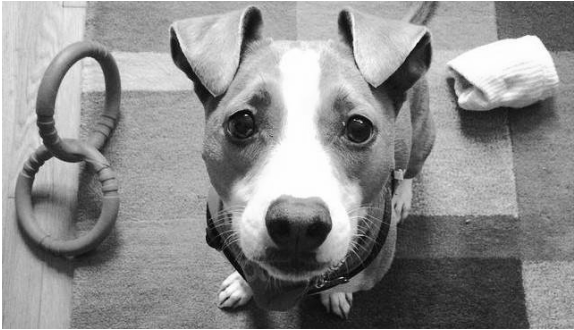|
A year ago, I got my first dog (a pit bull-chihuahua mix, if you can believe it). Nacho has since been my partner in crime through many career coaching calls and client meetings. As I began to observe Nacho’s behavior early on, I couldn’t help but draw several parallels between his canine conduct and a successful job search.
1. Develop a routine. For starters, Nacho begins each day with a pronounced stretch right before his long morning walk. Then there’s a lot of sleeping, eating, and staring out the window. Looking for a job can be mentally and physically draining, and having a routine that includes stretching and exercise gets you ready for the day’s challenges. Because the job search can take months, a routine helps you stave off the job search blues and keeps you focused for the long haul. Here’s a sample weekly routine some of my clients follow: Monday: bookmark new job postings, Tuesday: tweak resumes and cover letters, Wednesday: submit applications, Thursday: network online and off, Friday: follow up, write blog posts, and reflect on the week’s progress. You don’t have to follow this example, just find a rhythm that works for you and stick to it. If you experience a job rejection or a mental rut, you’ll have a familiar routine to fall back on. 2. Sniff out the competition. Nacho respectfully sniffs out other dogs he meets, whether they’re tiny teacup Yorkies or labs five times his size. In the job search, carve out ample time to research the industries and companies you’re targeting. Whenever possible, scope out your direct competition, that is, the other job candidates vying for similar jobs. What soft and technical skills do they have that you may be lacking? What can you learn from the successful candidates--and from the miserable ones? Conducting this “research” involves nothing more than heading to your local bar and, drink in hand, observing and talking to people. Of course, plenty of folks share their job search stories online. Take other people’s narratives with a healthy grain of salt, but don’t ignore them. You may be surprised by how much you learn. 3. Learn to follow basic instructions. When Nacho is told to sit, he sits. When he’s asked to raise his paw, he does just that. Similarly, when a job application specifically asks for a Word .doc version of your resume, make sure to attach it, even if you’re a staunch proponent of PDFs. After all, the recruiter (or the applicant tracking system software) might dismiss your application just because you’ve failed to follow basic instructions. Likewise, if you’re told that your interview begins at 1pm, don’t show up at 12:30. Your overzealousness won’t be misconstrued as insubordination, but it will inconvenience the interviewer’s schedule, or at least make you restless from all that idle waiting. At the most, show up 5-10 minutes early, unless the recruiter suggested otherwise. 4. Brush up on relevant skills. Nacho loves exploring new ground, literally. His tail wags passionately when he encounters foreign objects and strangers. There’s an elementary school across the street, and each night as Nacho walks by it, he gets wildly excited. Maybe he’s thinking about night school? To remain marketable in the ever-changing job landscape, you need to keep your knowledge and skills sharp. This is true of every industry, but especially highly-evolving ones like IT, biotech, media and marketing. Whether this means going back to school or casually exploring the smorgasbord of online resources, never stop learning. At worst, you’ll discover something new or realize you don’t want to follow a certain career path. At best, you’ll leverage your newfound skill set to land your next job. 5. Sleep like a dog. Snoozing is possibly Nacho’s favorite activity, next to having his belly rubbed. I could pull any sampling of random statistics touting the benefits of sleep (including Arianna Huffington’s The Sleep Revolution), but I’ll just take a page from what I observe directly: sleep-deprived employees are not functioning at their best. Even the passionate workaholics who appear ever-so-busy could accomplish a whole lot more, and avoid burnout, if they allowed themselves a bit more shut-eye. Cognitive faculties such as decision-making and creativity are significantly compromised by insufficient sleep. There is a mountain of advice on how to improve your sleep; find something that works for you. At worst, you’ll improve your heart, immune system, and mood. At best, you’ll achieve all that and you’ll be more productive and happier at work, which often leads to bigger and better things. 6. Have a social presence Even Nacho has an Instagram profile. Like it or not, recruiters are constantly checking out job candidates’ online profiles. The good news is that you can, to a large degree, control your image and social media "brand." So don’t be passive; don’t let others define your image. Curate it yourself. Beef up that LinkedIn profile. Remove old or inactive website profiles and de-clutter your online presence. If you haven’t already, consider starting a blog that is relevant to your industry. Or build a simple, one-page personal portfolio website. There are plenty of great examples online if you need inspiration. And if you need a quick break from all that job search stuff, check out @mydognachodog on Instagram. Guaranteed to make you smile.
0 Comments
Your comment will be posted after it is approved.
Leave a Reply. |
About DawidPoly-creative and complex human who fills up his days as a career coach, executive coach, resume writer, and personal brand / communications specialist. Conqueror of excuses and doubts. Bakes a mean éclair and snaps thought-provoking photos, but is best known for helping clients achieve personal + professional growth and fulfillment. Archives
May 2024
Categories
All
|


 RSS Feed
RSS Feed